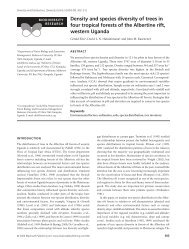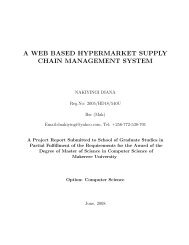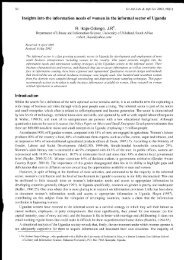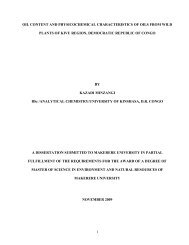THE UNIVERSITY OF LEIPZIG
THE UNIVERSITY OF LEIPZIG
THE UNIVERSITY OF LEIPZIG
Create successful ePaper yourself
Turn your PDF publications into a flip-book with our unique Google optimized e-Paper software.
learn that in practice, the definition of property rights on which the benefit sharing contracts<br />
are based, is not well defined. 66 Morris et al. make another observation, but in form of an<br />
intricate question: How can the contribution of poor communities to biodiversity preservation<br />
be assessed if classification of species takes centuries? This submission is strengthened by<br />
Laid one of the leading scholars on the subject of bio-prospecting contracts. She notes that<br />
Biodiversity Prospecting Contracts (BPCs) are the most common and most frequently used<br />
tools in the establishment of formal and legally binding relationships between providers and<br />
users of genetic resources at the local level. Such agreements take different forms and shapes.<br />
These agreements may be formally concluded in written documents or acknowledged by a<br />
shake of hands. These contracts may take varying forms including contracts for the sale of<br />
raw materials, Material Transfer Agreements (MTA), Licensing Regimes (LR), and<br />
Memorandums of Understanding (MOU). 67 Indigenous people may use agreements over<br />
traditional knowledge as a means to exercise control over biological resources considered to<br />
be of national patrimony. But observers such as Tobin note that, BPCs are merely a tool for<br />
bio-piracy, simply providing a cloak of respectability to arrangements viewed as inherently<br />
inequitable. This is due to the disappropriate negotiating strength of Multinational<br />
Corporations (MNCs).<br />
Furthermore, MNCs use these BPCs as a tool for misappropriation and monopolization of<br />
common goods through utilization of intellectual property rights regimes. At the national<br />
level, BPCs can also act as a disincentive to legislators in developing national Access and<br />
Benefit Sharing Measures (ABSM). However, the negotiations of highly visible BPCs have<br />
tended to raise public concerns on issues surrounding biodiversity prospecting. For example,<br />
research on biodiversity and traditional knowledge is funded by northern partner agencies and<br />
channeled through northern partner institutions. This sometimes breeds inequitable<br />
relationships with the owners of traditional local knowledge. The inequitable participation of<br />
local communities in such agreements has led to renewed discontency towards research in<br />
traditional knowledge. 68 On the other hand, it has also led to increased activity, public interest<br />
and national debate. In Kenya for instance, interest and concerns about the activities of the<br />
National Institute of Biodiversity (inBio) helped to format a participatory national debate that<br />
culminated into the adoption of a comprehensive National Biodiversity Strategy and Action<br />
Plan in 2000. It also helped in enlisting the importance of biodiversity in the current Forest<br />
Act. The strategic plan puts it clearly that Kenya has a considerable volume of indigenous<br />
systems and knowledge relevant to biodiversity. However, what is disappointing is that little<br />
of this knowledge has been documented or integrated within national programs or institutions.<br />
66<br />
Cracraft, J and F.T, Grifo. 1999. The living Planet in a Crisis: Biodiversity and Science and Policy. New<br />
York: Colombia University Press.<br />
67<br />
Laird, S. 2002. Biodiversity and Traditional Knowledge: Equitable Partnerships in Practice. London: Earth<br />
scan Publishers Limited.<br />
68<br />
Tobin, B. 1997. Biodiversity Prospecting Contracts: The search for Equitable Partnerships. London: Earth<br />
scan Publishers Limited.<br />
17






